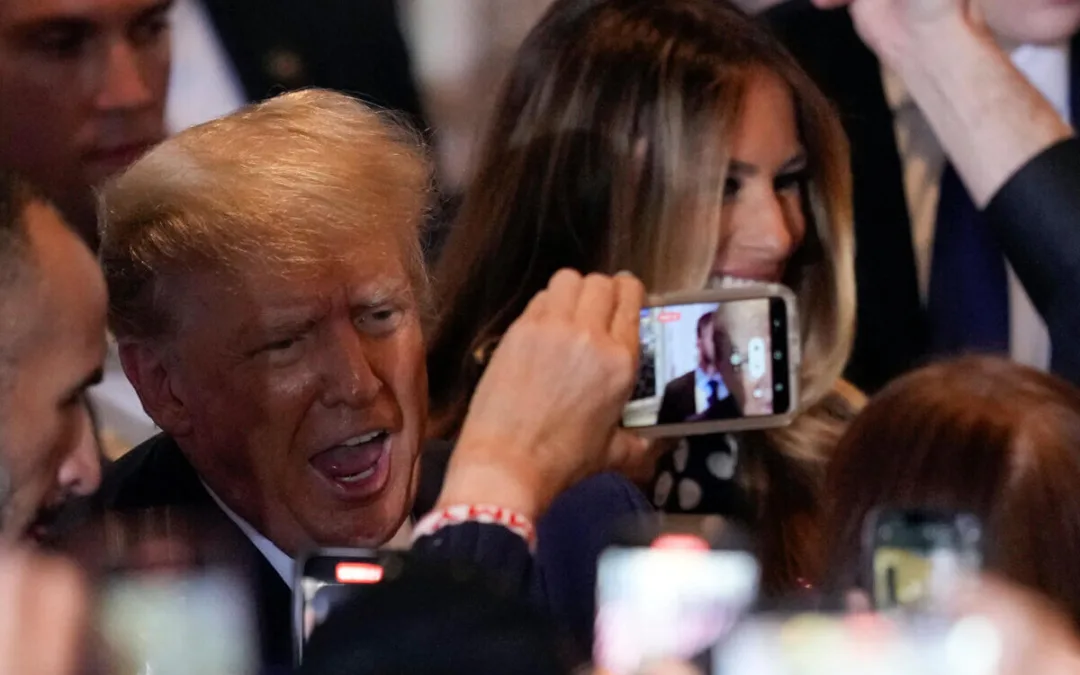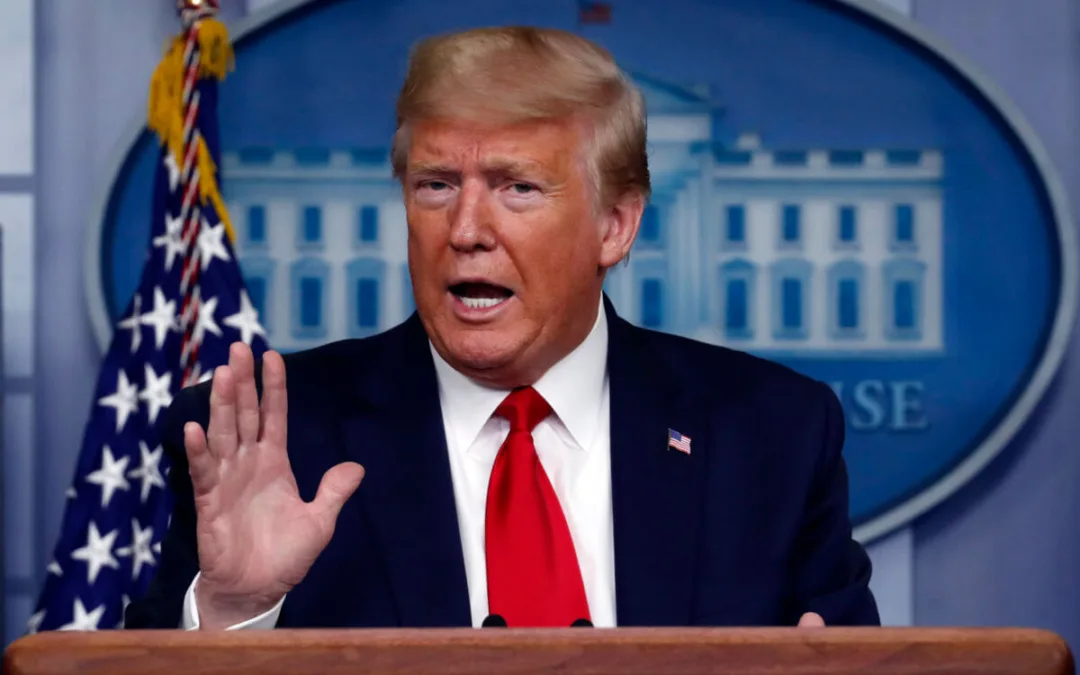
Anthony Davis of Upper Marlboro, Md., left, speaks to his son Jonathan, 13, right, as they look at a statue President Andrew Jackson in Lafayette Park, Tuesday, June 23, 2020, in Washington, with the word "Killer" spray painted on its base. Protesters tried to topple the statue Monday night. President Tump had tweeted late Monday that those who tried to topple the statue of President Andrew Jackson in Lafayette Park across the street from the White House faced 10 years in prison under the Veteran's Memorial Preservation Act. (AP Photo/Andrew Harnik)
“They’re not taking down our monuments,” Trump told White House reporters.
President Donald Trump said on Tuesday that he will sign an executive order on historical monuments, as statues related to the Confederacy and the United States’ colonialist past have been pulled down and defaced across the country.
Trump also tweeted on Tuesday that he had “authorized” the federal government to arrest anyone who vandalizes a statue or monument.
He also threatened protesters with “serious force” if they try to set up an “autonomous zone” in Washington, D.C., such as the one protesters have created in Seattle.
Some protesters in D.C. declared they had set up such an area, calling it BHAZ, for Black House Autonomous Zone, with the phrase spray-painted onto a piece of plywood, and “BHAZ” spray-painted on the columns of St. John’s Church.
The federal government has already, in fact, had the ability to arrest and prosecute anyone who damages such a monument, since 2003, under the Veterans Memorial Act. It states that anyone found guilty of destroying or attempting to destroy a plaque, monument, or statue “commemorating the service” of anyone in the armed forces can be fined, imprisoned for up to 10 years, or both.
According to Snopes.com, however, Confederate soldiers are not considered veterans of the United States military. “[N]o legislation either explicitly or implicitly granted Confederate soldiers status as United States veterans,” the author points out. “Survivors of dead Confederate soldiers often took offense at measures appearing to equate them to Union soldiers, objections that died off as Southerners from the Civil War era did.”
Late Monday night, protesters attempted to pull down a statue of Andrew Jackson on a horse, which sits in Lafayette Square, the park located directly across from the White House. Police stopped the action, utilizing pepper spray to disperse the crowd, before circling the statue.
Jackson, who served as the nation’s seventh president, was a slave owner and is also known for his brutal treatment of Native Americans. The statue of him in Lafayette Square, which is the first bronze statue ever cast in the U.S., was built in part by an enslaved man named Philip Reid.
Videos posted to social media show the base of the statue covered in graffiti with anti-police and anti-racism messages. Trump called the vandalism “disgraceful,” in a tweet he ended with the one-word sentence “Beware!” after pointing out the Veterans Memorial Act carries with it the possibility of a 10-year prison sentence.
During historic civil unrest and calls for reform over racial justice and inequality—which most Americans support—Trump has aligned himself with those who argue that Confederate and colonial statues should remain standing as a testimony to American history.
RELATED: George Floyd Protestors Topple Confederate Statues Across the South
“They’re not taking down our monuments,” Trump told White House reporters. “I will have an executive order very shortly and all it’s going to really do is reinforce what’s already there, but in a more uniform way.”
He said “numerous people” were in jail for attempting to take down the Jackson statue, adding that the federal government is “looking at long-term sentences.”
According to a new Morning Consult/Politico poll, Americans’ opinions on removing Confederate monuments are shifting. The survey found 44% of voters backing leaving up the monuments, down from 52% three years ago. It also found 32% of respondents saying they felt the monuments should come down, which is up from 26% in 2017.
Editor’s Note: This story has been updated with additional context.
Politics

Teamsters and UPS Reach Tentative Deal to Avoid Strike, 340,000 Workers to Get Raises
The tentative deal represents a huge win for full- and part-time UPS Teamster workers, who would get significant pay raises and better working...



One Republican Senator Is Blocking 265 Military Promotions, Leaving the Marines Without a Confirmed Leader
Sen. Tommy Tuberville's decision means these military officers are not getting the pay raises they’re owed, cannot move their families to wherever...
Local News



Teamsters and UPS Reach Tentative Deal to Avoid Strike, 340,000 Workers to Get Raises
The tentative deal represents a huge win for full- and part-time UPS Teamster workers, who would get significant pay raises and better working...



One Republican Senator Is Blocking 265 Military Promotions, Leaving the Marines Without a Confirmed Leader
Sen. Tommy Tuberville's decision means these military officers are not getting the pay raises they’re owed, cannot move their families to wherever...




